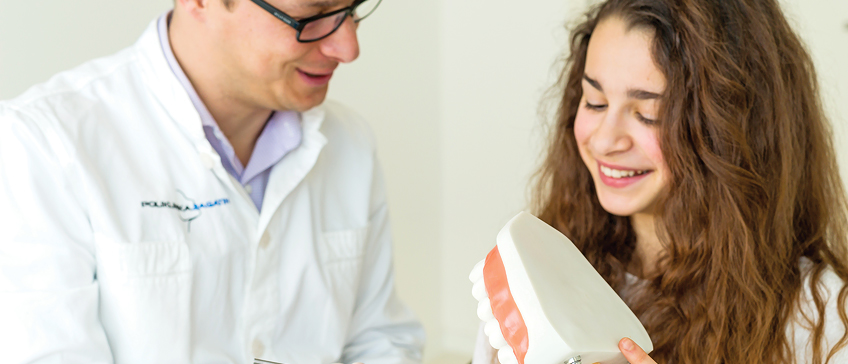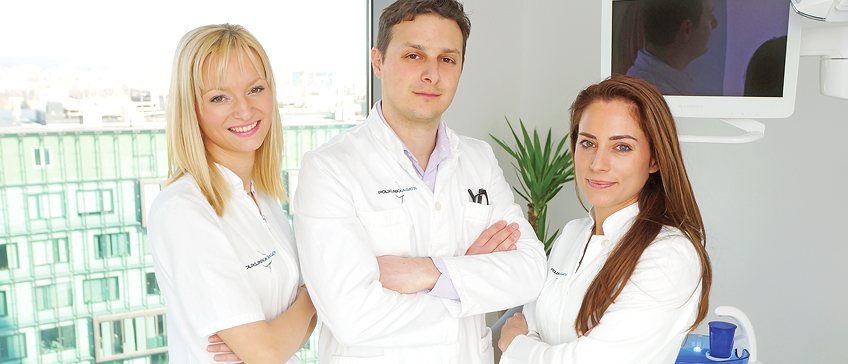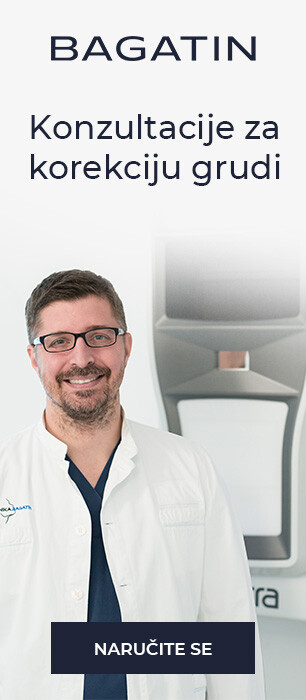Paediatric dentistry Programme at the Polyclinic Bagatin
For healthy teeth from the first smile.
Is there anything more charming than a wide smile of a baby who had just started teething? To make the first primary teeth grow into a nice smile at a mature age, we need to take care of our teeth from birth. It is wrong to assume that primary teeth are not as important as permanent ones, and that it isn’t as important to look after them. Primary teeth health is extremely important because they keep a place for permanent teeth and direct the growth of permanent teeth. They also stimulate proper jaw development. In most children, the first primary teeth appear at 5-7 moths, but earlier or later appearance is not uncommon. By the age of 3 all primary teeth should have already erupted. At that age, permanent teeth also start growing. Regular check-ups, proper oral hygiene and a healthy diet will ensure primary teeth are properly replaced by permanent teeth.
The first visit to the dentist should happen around the age of 1. With such an early approach it is possible to recognize possible problems in child’s oral health, and at our Polyclinic the parents can get information about the importance of preventive measures such as proper way of brushing and selection of tooth paste and tooth brush. At that age, the oral hygiene habits the children develop will most commonly be carried forward into adult age. Parents play a crucial part in this process. With the parents we develop a plan which will suit their child best. Children learn by imitating grown-ups so a parents’ personal attitude toward oral hygiene their habits are children’s best role model. Our dentists try to create a positive relationship between a child and his/her teeth through dental visits and therapies. We want to make sure our youngest patients feel safe and that is why we created a programme which will motivate children to see teeth brushing as an exciting and fun process and not fear a dentist when they need to see one.
A child’s first visit to the dentist should include introduction to the dentist, his/her office, instruments and teeth in general, without procedures that might cause a negative reaction and fear of dentists.
At Polyclinic Bagatin, when visiting our dentists you can expect:
During the first visit we work on developing a trust between the child and the dentist. For this reason it is important the first visit happens when there is still no need for dental treatment. This way, a child will see visiting a dentist as something completely natural.
If the child is still very young and can’t brush his/her teeth by his/her self, we teach parents how to take care of your child’s first teeth and how to ease their eruption without nervousness and unpleasantness.
We introduce the children who are old enough to brush their own teeth with teeth in general and how to properly maintain oral hygiene.
With interesting illustrations and stories we encourage children to learn about caries and importance of regular and proper brushing, and through playing we try to examine their current state of teeth and gums.
At our Polyclinic all the children who are brave enough to accept therapy are awarded a special diploma for bravery.
After the visit, the children are given their first package for teeth maintenance and further instructions on how to continue brushing teeth at home.
Paediatric dentistry Programme at the Polyclinic Bagatin
With this approach we try to encourage children to properly look after their teeth and gums, in order to keep their natural smile and seek therapy on time if there is need for it. You can learn more about the most common procedures in paediatric dentistry here.
If you wish to make an appointment for your child for examination and consultations, feel free to call us at 01/46 10 225 or email us to info@bagatin.hr.
Free online consultation with our doctors
Send enquiryFeel free to contact us
By phone on +385 1 46 10 225 or through our online contact form
Send enquiry
Locations
| Green Gold Tower Ul. Grada Vukovara 269a/10, 10000 Zagreb |
|
| Donji grad Frana Folnegovića 1c/1, 10000 Zagreb |
|
| Dioklecijan Hotel & Residence Kranjčevićeva 45/1, 21000 Split |
Where to park
| Parking available in Green Gold centre, Zagreb underground garage. For detailed information download a map |



